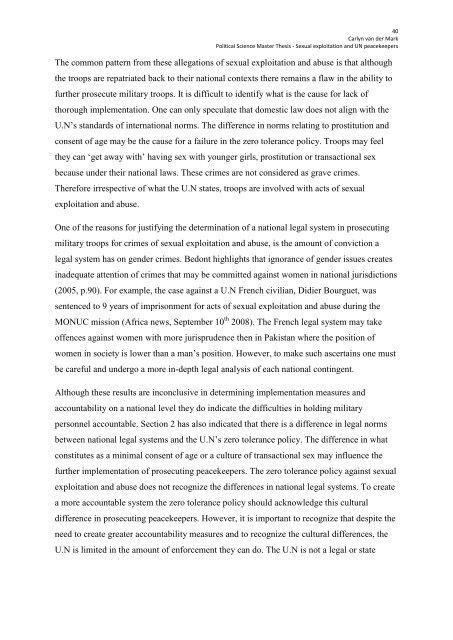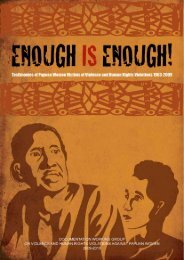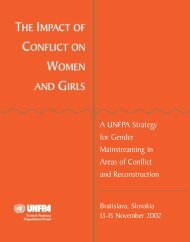Sexual exploitation and abuse by UN peacekeepers - PeaceWomen
Sexual exploitation and abuse by UN peacekeepers - PeaceWomen
Sexual exploitation and abuse by UN peacekeepers - PeaceWomen
You also want an ePaper? Increase the reach of your titles
YUMPU automatically turns print PDFs into web optimized ePapers that Google loves.
40<br />
Carlyn van der Mark<br />
Political Science Master Thesis - <strong>Sexual</strong> <strong>exploitation</strong> <strong>and</strong> <strong>UN</strong> <strong>peacekeepers</strong><br />
The common pattern from these allegations of sexual <strong>exploitation</strong> <strong>and</strong> <strong>abuse</strong> is that although<br />
the troops are repatriated back to their national contexts there remains a flaw in the ability to<br />
further prosecute military troops. It is difficult to identify what is the cause for lack of<br />
thorough implementation. One can only speculate that domestic law does not align with the<br />
U.N‟s st<strong>and</strong>ards of international norms. The difference in norms relating to prostitution <strong>and</strong><br />
consent of age may be the cause for a failure in the zero tolerance policy. Troops may feel<br />
they can „get away with‟ having sex with younger girls, prostitution or transactional sex<br />
because under their national laws. These crimes are not considered as grave crimes.<br />
Therefore irrespective of what the U.N states, troops are involved with acts of sexual<br />
<strong>exploitation</strong> <strong>and</strong> <strong>abuse</strong>.<br />
One of the reasons for justifying the determination of a national legal system in prosecuting<br />
military troops for crimes of sexual <strong>exploitation</strong> <strong>and</strong> <strong>abuse</strong>, is the amount of conviction a<br />
legal system has on gender crimes. Bedont highlights that ignorance of gender issues creates<br />
inadequate attention of crimes that may be committed against women in national jurisdictions<br />
(2005, p.90). For example, the case against a U.N French civilian, Didier Bourguet, was<br />
sentenced to 9 years of imprisonment for acts of sexual <strong>exploitation</strong> <strong>and</strong> <strong>abuse</strong> during the<br />
MONUC mission (Africa news, September 10 th 2008). The French legal system may take<br />
offences against women with more jurisprudence then in Pakistan where the position of<br />
women in society is lower than a man‟s position. However, to make such ascertains one must<br />
be careful <strong>and</strong> undergo a more in-depth legal analysis of each national contingent.<br />
Although these results are inconclusive in determining implementation measures <strong>and</strong><br />
accountability on a national level they do indicate the difficulties in holding military<br />
personnel accountable. Section 2 has also indicated that there is a difference in legal norms<br />
between national legal systems <strong>and</strong> the U.N‟s zero tolerance policy. The difference in what<br />
constitutes as a minimal consent of age or a culture of transactional sex may influence the<br />
further implementation of prosecuting <strong>peacekeepers</strong>. The zero tolerance policy against sexual<br />
<strong>exploitation</strong> <strong>and</strong> <strong>abuse</strong> does not recognize the differences in national legal systems. To create<br />
a more accountable system the zero tolerance policy should acknowledge this cultural<br />
difference in prosecuting <strong>peacekeepers</strong>. However, it is important to recognize that despite the<br />
need to create greater accountability measures <strong>and</strong> to recognize the cultural differences, the<br />
U.N is limited in the amount of enforcement they can do. The U.N is not a legal or state




![IANSA [PDF, 2MB] - PeaceWomen](https://img.yumpu.com/25206379/1/190x123/iansa-pdf-2mb-peacewomen.jpg?quality=85)
![Commitments Sample [PDF, 93KB] - PeaceWomen](https://img.yumpu.com/25206331/1/190x245/commitments-sample-pdf-93kb-peacewomen.jpg?quality=85)










![A Toolkit for Advocacy and Action [PDF, 260KB] - Peace Women](https://img.yumpu.com/25205989/1/190x245/a-toolkit-for-advocacy-and-action-pdf-260kb-peace-women.jpg?quality=85)